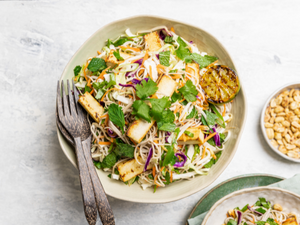Maximise your exercise performance with carbohydrates and protein

This blog was written in collaboration with our partners at GI Foundation. For more Low GI inspiration and education visit gisymbol.com.
Eating a well-balanced diet can help you get the calories and nutrients you need to fuel your daily activities, but it can be confusing to know what foods to eat to help fuel your exercise program. It’s important to eat the right types of foods, like low GI carbohydrates and protein, at the right times of the day to maximise your exercise performance.
What to eat before a workout
When we exercise, our bodies need energy. This energy is supplied by fuel, either stored in our bodies (as carbohydrate in our liver and muscles, or from fat stores), or from the food we eat. If the exercise is demanding or if we exercise for a long time, we use more stored carbohydrate, known as glycogen.
If your goal is building strength or muscle, evidence suggests that eating protein before exercise may improve overall recovery responses. By providing essential amino acids before they’re needed, this could support early recovery and may be relevant for those undertaking intensive workouts. Enjoying a low GI higher protein smoothie for example could be an easy to digest pre-work out meal.
Studies have also shown that carbohydrates in our diet are important in topping up our glycogen stores between exercise and also when eaten before exercise sessions.
So if your energy is low, or you’re doing a longer or more demanding session, eating carbohydrate-rich foods – such as pasta, rice, cereals or fruit – around three to four hours before exercise can help provide the energy you need to keep moving and performing at your best.
There’s also evidence that carbohydrate type can help improve your metabolic responses to exercise. While this may not necessarily affect performance, eating lower glycemic index foods (foods that produce a slower release of glucose i.e. sugar, into your bloodstream to working muscles) can better sustain energy levels.
What to eat after a workout
Research has shown the benefits of eating low GI carbohydrates after exercise to restore muscle glycogen. Not only does this affect our ability to train more often by helping muscles recover faster, it’s also shown to affect how well we perform.
Studies have also demonstrated that eating soon after finishing exercise (as opposed to waiting for a few hours) can help maximise recovery, particularly if a carbohydrate intake of about 1.3 grams per kilogram of body weight per hour is consumed during the two-to-six hour short-term recovery phase.
There’s also an overwhelming amount of evidence pointing towards the importance of protein in helping the body recover from exercise. Research also shows that if training is done later in the day, then consuming a small protein meal, such as a shake, before bed can also help with acute recovery leading to muscle growth.
In the case of resistance training, such as lifting weights, research has shown that consuming a combination of mainly carbohydrate and protein immediately before and after training will help provide better muscle and strength gains over ten weeks compared with consuming these nutrients away from training.


